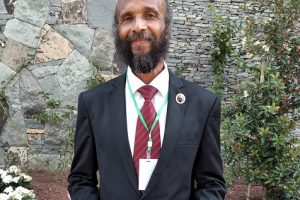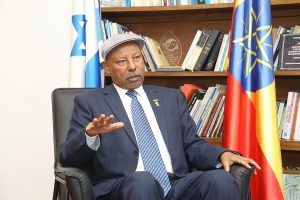
– Assistance Professor Ahmed Zekaria
Today, Ethiopia is one of many countries that have no ports. So many years have elapsed since the country has lived without a port. When Eritrea was declared independent, it took both the Assab and Massawa ports.
The East African country has several options for peaceful access to the sea. All of them could have a positive economic impact not only in Ethiopia but across the region. The options include further engagement with Eritrea, Djibouti, and Somaliland on equitable terms for the use of their ports.
The Lamu Port-South Sudan-Ethiopia Transport (LAPSSET) corridor with Kenya, which is still in its early phases, could also be a game-changer in the region if built to completion. Ethiopia is one of the fastest-growing economies on the continent. It also has a large population, estimated at around 126 million and projected to grow at about 2.7% a year. This indicates a big market, and many needs need to be met.
Economic development became central to fiscal and economic planning and projections in the period between 2000 and 2012. But lack of direct coastal access became a notable obstacle to Ethiopia’s efforts to achieve middle-income status via export-oriented industrialization. At one time, Eritrea’s Assab port handled 70% of Ethiopia’s trade.
At present, Ethiopia’s imports and exports mainly pass via the port of Djibouti. Reliance on Djibouti has proved costly and unsustainable, however, leading Addis to search for alternatives. Coastal access would give Ethiopia more political clout to help it achieve its ambition of dominating the Horn of Africa.
Peaceful access to the coast would depend on its relationships with its neighbors. Some have been strained, others harmonious.
Since 1991, Ethiopia has been on a path of regional dominance, aided by its economic dominance in the region and in Africa. This was interrupted by its war with Eritrea between 1998 and 2000, which remained unresolved until 2018. The conflict limited but did not end Ethiopia’s political ambitions in the region, as seen in the country’s foreign policy since the early 1990s. Addis has appeared willing to get its own way in the region by whatever means.
Ethiopia continues to host the African Union and has been an active and dominant member of the Intergovernmental Authority on Development, a regional organization. Since 2018, the country’s foreign policy has taken a conciliatory tone. We see this in the rapprochement with Eritrea following a peace deal that restored relations between the two states after two decades of conflict. This suggests a shift from a rigid security-focused foreign policy to a more pragmatic approach to issues that include diplomacy, climate change, migration, terrorism, and access to the sea.
Because of its history and geopolitical position, Ethiopia has the potential to be a force for either stability or instability in the region. Finding a peaceful way to improve coastal access would make it a force for stability. Today’s guest of the Ethiopian Herald is Ahmed Zekaria, Assistance Professor at the Institute of Ethiopian Studies, Addis Ababa University. He recently had a short stay with Ethiopian press agency reporters and raised important issues on how Ethiopia can access the sea port. Enjoy the reading!
First of all, how would you describe the East African region where Ethiopia is located?
The East African region has numerous histories, and it is an area where various miracles were undertaken. As it is the cradle of humanity, Ethiopia is a country that has several histories. The East Africa region is tied up in a multitude of problems. In this region, there are two types of restless envy. This is more concerning in Ethiopia. These rivals are classified into two categories: historical and natural. Historical rivalry has a wide and long history. Natural rivals are envious of the wealth of the country.
How would you describe Ethiopia’s role in the region, especially in the Red Sea area?
Water movements are a sign of civilization. This is expressed in big rivers and seashores. All civilizations seen so far revolve around this. For instance, humankind is moving here and there using various modes of transportation, such as on foot, on mule, on horseback, and on camel, as well as vehicles, trains, and airplanes. However, there is no mode of transportation greater than ships do in terms of bringing benefit to the country.
As our economic activities were limited, we did not comprehend the advantages of ports and ships and the benefits they bring to a nation’s economy. As time goes on, our population is increasing alarmingly, followed by an increase in demand for consumer goods. Above all, the economic progress that we have recorded so far has forced us to look into alternative ships.
The desire to seek additional ships also forced us to see alternative ports. At times, when Ethiopia was the owner of the Red Sea, it exported what it produced to Middle East countries. Ethiopia, the owner of the Red Sea and Massawa ports for centuries, is now becoming poor and backward.
In those years, Ethiopia was a pioneer among many countries that gained political, social, and economic diplomatic progress in the Red Sea region. With this, Ethiopia has been recoiled by various foreign diplomats as it has built a capacity that can change the world scenario. The secret behind this is its ownership of the port.
The history of the Red Sea is wide, and it is correlated with Christianity, Islam, and Judaism. As it was a place that centralized the Nile Gorge civilization, we will talk about its history. Because Ethiopia was able to control the Red Sea port, it was a cause for the development of the Axum civilization. Sea trade was the primary reason to be counted as a top civilization, among others.
How could Ethiopia lose its dominant power over the Red Sea port?
Ethiopia has lost its red sea dominance due to colonization. The Horn of Africa is a strategic place that magnetizes the attention of many countries. As the area is found between the Red Sea and Nile River basins, it grabs the interest of many countries. Both Red Sea and Nile politics are not only a reason for cooperation but also a source for fragmentation among east African countries. It is an area where other countries are also daydreaming of being in command of.
The Red Sea, in connection with the opening of the Swiss Canal, becomes a world trade corridor. Making the Red Sea under control is the curiosity and daydreaming of the world’s superpowers. In order not to be jealous of them, these powers made Ethiopia distant from the area.
In the East Africa region, there are eight countries. These countries have enough knowledge and capacity to consult on the process of resolving problems. The aims of the Intergovernmental Authority for Development (IGAD) were to safeguard the East Africa region from famine and drought. Being portless is another face of drought, and thus things should be facilitated in a way to develop and use natural resources. Together, it is imperative to look at alternative means.
Ethiopia is a water tower of East Africa. The country should repeat the long historical process of negotiable use of natural resources in ports as well as agree with neighboring countries. In order to make this happen, it may require consultation and dialogue of various kinds. And I believe that we can resolve the problems encountered and strengthen bilateral benefits.
Our Afari’s brothers and sisters have been safeguarding the boundary. The trade conducted in border areas is also highly attached to these people. Those who live in the highlands are not able to reside in the lowlands. And civilizations are found in the lowlands. As the climate in the lowlands is not conducive to human beings, many people do not prefer to go there. Therefore, the highlanders were trading down to the lowlanders. This is a common act that still continues.
The invasion of the Ottomans and Turkey in the 16th century shook the area. We suffered a lot due to the damage. As a result of this, Port Massawa and other places were occupied by the Ottomans until the 19th century.
Following the opening of the Swiss Canal, the shaking increased. The desire of all colonizers was met. Especially as it enabled Chinese and Indians to decline their trade activities to Africa by half and as the Red Sea route is serving as a crossroads for fuel, the significance of the Red Sea is increasing. There is also Ethiopia’s share in this because the colonialists in the 19th century conquered Djibouti, Eritrea, and Somalia from the Horn of Africa. Ethiopia’s port share is also far away.
In the period after the fascist war, Eritrea returned to its motherland, and we lived in peace, but our leaders made wrong decisions, and Assab Port was taken. Though there were many historical and legal grounds to make Assab Port part and parcel of Ethiopia, we lost it due to the wrong decision made by our politicians.
Still, Ethiopia’s quest for a port should be resolved peacefully and through consultation. Our natural resources should be a means of bilateral cooperation, but not something that we are proud of. At present, our population has reached more than 120 million. It is unfair to say that a country with more than 120 million people will continue without a port. This is also not good for the region. Therefore, the role of intellectuals is high in order to use the Red Sea route peacefully.
What has Ethiopia lost after its dominance role in the East African region is shrinking?
Being landlocked for the past thirty or so years has caused us countless harm, and we have lost many things. As a country, our trade is hampered. Our expenses are very high. We were unable to import weapons or other things as we wished. To avoid this problem, as the Prime Minister said, we may need to look at several options. For example, jointly developing a port with landlocked neighbors, providing some of the infrastructure that it aims to get, exchanging places, and so on can be seen as an alternative to getting a port. When we consider all these alternatives, we must not forget that following a peaceful process is our first and last option.
On the other hand, ensuring internal peace is a priority. An effort to solve the country’s affairs in a peaceful way at any time is homework that is expected from the government or from us citizens. Above all, internal peace must be ensured. Another thing is that every citizen should have a sense of patriotism.
How do you see the work being done to strengthen Ethiopia’s role in the region since the change?
It’s good that leaders are making a lot of speeches. There will probably be some rough patches until everything is lined up. For example, Somalia and Ethiopia have made some agreements, though each has its own weak sides. But now, various tasks are being done to discuss them with all IGAD member countries. Therefore, I believe that strengthening the task done so far, considering the current conditions of the world, and allowing the discussions and consultations to proceed in that form will bring us closer to the result.
If there are international experiences taken to confirm the port owner using peaceful options, could you please explain some to them?
The world experience shows us that the give-and-take principle is always important. Therefore, the IGAD member countries should be able to sit down and discuss the political problems that can be resolved. We understand that everyone is under external pressure. The discussant should take their influencers into consideration and resolve problems while standing on their own two feet.
The situation becomes very difficult if the countries are engaged in unnecessary computation and become greedy standing for their benefit alone. Therefore, I say that the leaders of the eight countries as well as the people of Ethiopia should facilitate and open a platform to discuss the situation. If this can be done and the basis is established, it will not be difficult to agree.
Thank you very much for the time.
It is my pleasure.
BY GIRMACHEW GASHAW
THE ETHIOPIAN HERALD SATURDAY 4 NOVEMBER 2023





